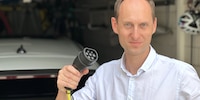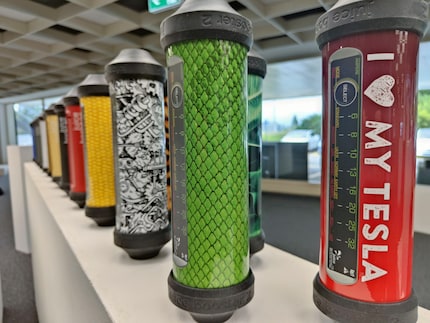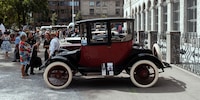
Background information
From combustion engine to electric car - an experience report with ups and downs
by Martin Jungfer

Juice Technology manufactures and sells charging solutions for electric vehicles. Christopher Gewohn is the man in charge of current and future lines of business at the company. In this interview, he speaks about range anxiety, charging networks and an old BMW convertible.
Planes are roaring into the sky above us; cars are rushing by on the A51 just behind the parking lot hedge. In terms of transportation, Juice Technology headquarters are conveniently located. They’re at the motorway exit Bülach-Süd in an industrial estate of the kind that exists by the dozen in Switzerland.
And yet, something special is happening here. Almost every employee parking space has a Tesla on it. Here and there, you’ll find a different brand of electrically powered car. Only one old BMW convertible, on the verge of being an antique, is holding out against this modern-day uniformity.
We’re at Juice Technology headquarters to meet Christopher Gewohn for an interview. We want to ask the Business Development Manager about how the electromobility business is coming along. At «Juice» – to keep it short and hip – they should know. After all, this is where charging solutions are developed that you need if you own an electric car.
The company is currently expanding. Its new headquarters in the Bachenbülach industrial estate was only acquired in June this year. Works are still underway everywhere you look. Only parts of the huge office space are already home to desks, workbenches and testing stations. There’s plenty of space for further expansion.
For our interview, we retreat to a sofa in a quiet sitting area in the basement. Behind us, the wall is adorned with LED neon tubes moulded into shapes that exude casual cheerfulness. It goes without saying that the company has a first-name policy.
Christopher, as a pupil, were you any good at physics?
Not particularly. I was more of a language person. Why do you ask?
I imagine that daily life at Juice Technology is all about electricity, energy, watts and amps, right?
Yes, that’s true. And that’s why I need a deep understanding of it all. I sit down with our engineers a couple of times a week to find out about current developments, product-specific innovations and technical details.
But you’re not an engineer yourself.
No, I studied business administration. I joined Juice Technology in 2018. At the time, there were six employees, including myself. Today, the company counts more than 100 on-site employees, and over 200 worldwide.
What piqued your interest?
Before joining Juice Technology, I was with a consumer electronics brand. But working in a field that’s just emerging is definitely something else. At the time, electric mobility was a new concept and needed lots of explaining. It wasn’t just about listing the benefits of a product and getting consumers to buy it. It was about raising awareness. Electromobility and electric cars aren’t a new thing, but this type of transportation hadn’t yet established itself at that point in time. So the exciting thing for me was not only to develop Juice on a business level, but also to actively shape the entire industry.
An educational task in a sense. I imagine there’s still a lot of explaining to do when it comes to electric mobility.
It’s not all that complicated. Drive, brake, refuel – or the new part: charge. Instead of gasoline or diesel, your car now consumes electricity. The only part that needs some getting used to is the charging process itself. You no longer have to drive to the gas station to charge your vehicle, but can plug it in wherever you happen to be – at home, at work or, with mobile charging solutions, anywhere with a power socket.
But this is where things get complicated. Charging power, CCS, Superchargers and the like – all these terms and abbreviations are already enough to make some people feel giddy.
That’s why we at Juice Technology and anyone wanting to advance electromobility need to make the world simpler. With clever charging solutions, for example.

Does this mean hydrogen propulsion or so-called green fuels don’t stand a chance?
For passenger cars, e-fuels, i.e. synthetically produced fuels, could serve a niche. Think classic cars or sports cars. However, the switch to electric mobility is in full swing. After all major car manufacturers jumped on the bandwagon and the government started to push electromobility, it became clear that this development can’t be stopped. Give it ten years at most and 90 per cent of drivers will have gone electric.
Will the issues we’re currently facing also be solved by then? I’m talking about low ranges and slow charging.
Issues is the wrong word. There are enough power sources to charge your vehicle, they just need to be made accessible. Vehicle ranges are also increasing more and more. However, in the trade-off between fast charging and more range, we can assume that car manufacturers will choose the middle ground. In concrete terms, this could mean achievable ranges of 600 or 700 kilometres. More wouldn’t make much sense, because nobody enjoys or is capable of focussed driving for that long without taking a break. Charging will take longer than the five minutes we’re used to when filling up at a gas station. I reckon people are willing to accept 15 to 30 minutes. That’s enough time for a toilet break and a cup of coffee before hitting the road again.
As a driver, I then want to be sure that I can actually find an available charging station and that it works.
Definitely. There’s a lot happening on the market. For example, Tesla has announced plans to open its Supercharger network to cars from other brands. I don’t think that each vehicle brand will still have its own charging network a few years down the line.
But to date, travelling on electricity still involves careful planning.
In Switzerland, the charging infrastructure is excellent. There’s no good reason not to drive electric. The standard average distance covered per day and person is about 40 kilometres – this includes German drivers. There’s really no need for anybody to suffer from range anxiety anymore. As I said earlier, you drive to your destination and recharge at work or at home.
**But this isn’t yet possible for longer journeys or crossing borders. **
For field workers who cover 200 or 300 kilometres every day, it’s not always perfect, but it does work. For longer trips, particularly to countries that aren’t yet well developed for electromobility, a little planning is still required. And maybe a little deceleration. Personally, I think this is a plus in today’s fast-paced world. It can even be a pleasant experience. Imagine quietly whirring through the narrow streets of a small Italian town without anybody getting annoyed.
It goes without saying that you drive electric. It’s something that seems to be mandatory if you work here. What’s your advice for someone who’s still on the fence about going electric?
I’d suggest simply giving it a go. Drive an electric model for a weekend or a whole week. It will make many worries and fears disappear. Plus you get to enjoy the feeling of stepless acceleration. Or you could try to set range records or push the power consumption.
You speak from experience?
Indeed. It’s quite a thrill when the range indicator is down to single digits and you’re on a highway at three in the morning.
This wouldn’t happen to the employee who drives the old BMW convertible we saw in the parking lot.
Well, it depends. If a driver of a combustion engine completely runs out of gas, things would get a bit hairy on the motorway for them, too. The advantage of an electric car is that you can look for a regular socket to charge it. A gas pump attached to a residential building, on the other hand, is rather rare. (laughs)
Christopher, thank you for taking time to talk to us.
Journalist since 1997. Stopovers in Franconia (or the Franken region), Lake Constance, Obwalden, Nidwalden and Zurich. Father since 2014. Expert in editorial organisation and motivation. Focus on sustainability, home office tools, beautiful things for the home, creative toys and sports equipment.
Interesting facts about products, behind-the-scenes looks at manufacturers and deep-dives on interesting people.
Show all
Background information
by Martin Jungfer

Background information
by Dominik Bärlocher

Background information
by Dominik Bärlocher